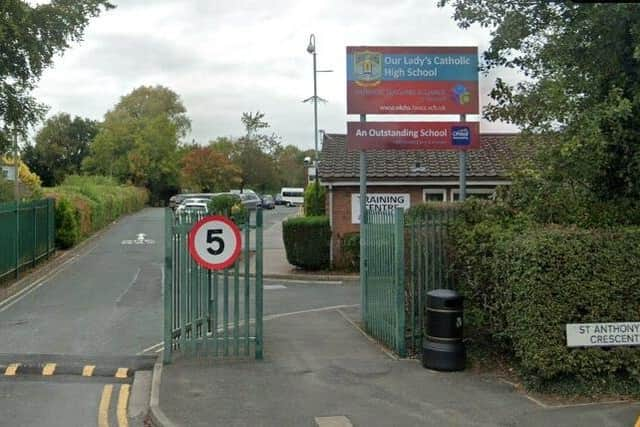Preston school closed over RAAC 'concrete collapse' fears as politicians call for all affected facilities to be identified
and live on Freeview channel 276
Our Lady’s Catholic High School in Fulwood told parents and carers of its 900 pupils on Friday afternoon that it will be unable to reopen as planned on Monday “pending further investigation”.
The building, on St. Anthony’s Drive, has been identified as containing reinforced autoclaved aerated concrete (RAAC), which can collapse without warning when it reaches the end of its lifespan.
Advertisement
Hide AdAdvertisement
Hide AdAcross England, over 100 schools were ordered to close on Thursday - either in full or in part - as a result of a change in government guidance over the safety of the material.


However, it appears that Our Lady’s closure could be an addition to that nationwide tally, because a letter to parents, seen by the Lancashire Post states that the school was advised only on Friday that it would have to keep the school gates locked on Monday and Tuesday next week.
Earlier in the day, the Post revealed that another Preston school - which has not been named - was one of what Lancashire County Council described as “a small number” to which it had sent surveyors to carry out checks “as a precautionary measure” due to the age of the buildings.
The authority appeared to distance itself from how church-run schools like Our Lady’s and those operated by academy trusts might be affected, saying that the Department for Education (DfE) was “liaising directly” with such establishments.
Advertisement
Hide AdAdvertisement
Hide AdIt added that of the 303 maintained facilities for which County Hall is responsible - out of a total of 628 schools in Lancashire - the council had “no safety concerns” after undertaking visual surveys at those sites where a RAAC presence was possible.


However, the emergence of a potential issue with Our Lady’s suggests that Lancashire may not have escaped unscathed if affected schools are going to come to light by different routes.
In his letter outlining the situation facing the Fulwood secondary, headteacher Richard Charnock said: “Some areas of our school have been identified as having RAAC and there is further potential that other areas of the school may be affected.
“We have been advised this afternoon by the Diocese of Lancaster to close the school pending further investigation. Therefore, unfortunately, I have had to take the very difficult decision to delay the start of the school year.
Advertisement
Hide AdAdvertisement
Hide Ad“School will not open on Monday and Tuesday as per our published calendar. We are hoping to meet with advisers on Monday to seek further information and advice.
“I have not taken this decision lightly; however, the safety of our pupils is paramount. Any contingency plans will prioritise the continuation of education and ensure that any impact on our pupils is kept to an absolute minimum.
“I appreciate that this will cause disruption and upset, and we will be in contact on Tuesday with an update.
“I would like to thank you for your understanding and support whilst we deal with this very challenging situation.”
Advertisement
Hide AdAdvertisement
Hide AdThe Post was unable to reach the school or the Diocese of Lancaster late on Friday for further comment.
Ian Watkinson, secretary of the Preston branch of the National Education Union (NEU) and chair of its nationwide health and safety committee, called for more local transparency about the emerging situation in Lancashire.
He told the Post: “It’s to be hoped that further disruption can be avoided. Headteachers need time and proper notice and support to be able to put alternative classroom measures in place if they are needed.
“In the meantime, we’ve been inundated with queries and it would surely help reassure parents if Lancashire County Council, the dioceses and the multi-academy trusts would share the details of all the schools with RAAC which are subject to those extra surveys.
Advertisement
Hide AdAdvertisement
Hide Ad“It’s puzzling why there seems to be a reluctance to do that,” added Mr. Watkinson, who had earlier queried the robustness of the school self-assessment questionnaires that the government had used to determine the extent of RAAC use across the country.
Meanwhile, John Potter, one of the Preston city councillors for the Cadley ward - in which Our Lady’s High sits - took aim at ministers over the issue.
“This is a disgraceful failure by the government and questions need to be asked of Conservative-run Lancashire County Council as well.
“The Conservatives can afford to write off billions of pounds worth of dodgy Covid contracts, but my residents have to put up with sewage in our waters, the NHS on its knees and dangerous school buildings at risk of collapse.
Advertisement
Hide AdAdvertisement
Hide Ad“My ward, Preston and the country deserves better than this shambles,” Cllr Potter said.
Cllr Neil Darby, Liberal Democrat Parliamentary Spokesperson for Preston, added that the government “must come clean about what schools in Preston are affected by crumbling concrete”.
He said: “The secrecy about where these schools are located is creating worry and concern for all parents and teachers. The fact we already know of one school in Preston will only add to that concern.
“Pupil safety must always be paramount and parents in Preston want to be reassured that they are not sending their child back to school in an unsafe building that may collapse”.
Advertisement
Hide AdAdvertisement
Hide AdThe government has so far declined to publish a list of the affected schools across England, with schools minister Nick Gibb telling BBC Radio 4’s Today programme on Friday morning that he wanted parents “to hear from [their child’s] school, not read about it in the media first”.
The use of RAAC was most widespread between the 1960s and 1980s.